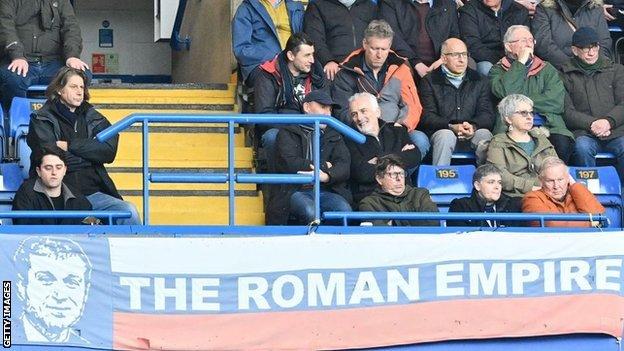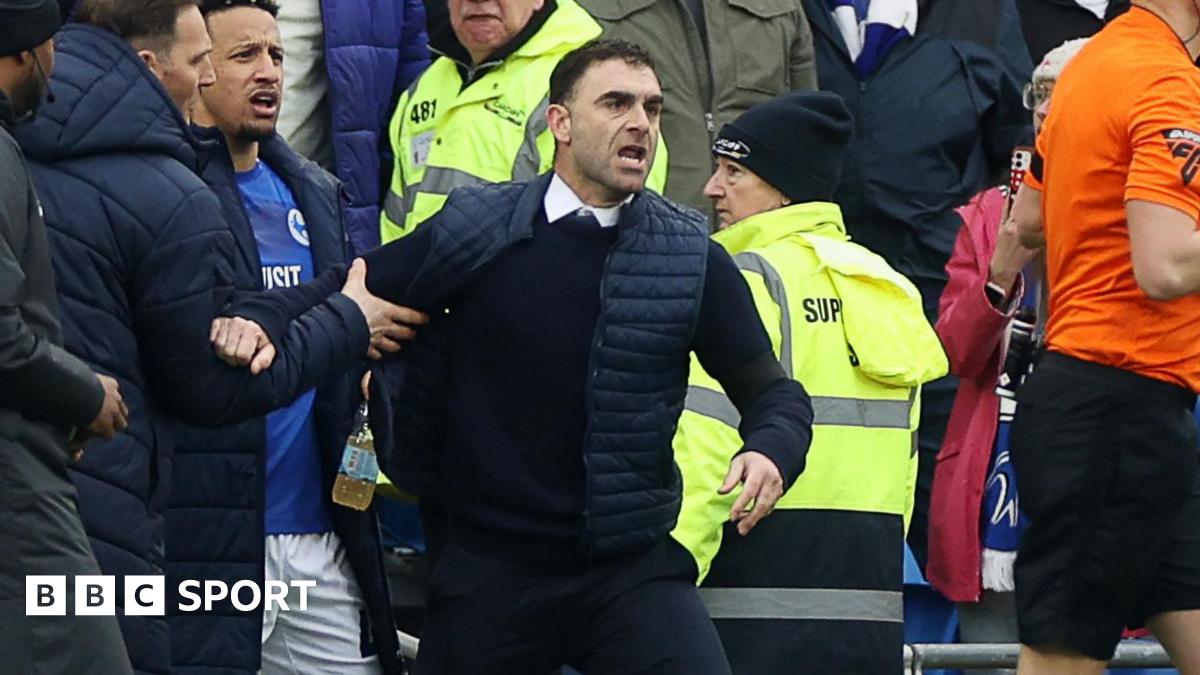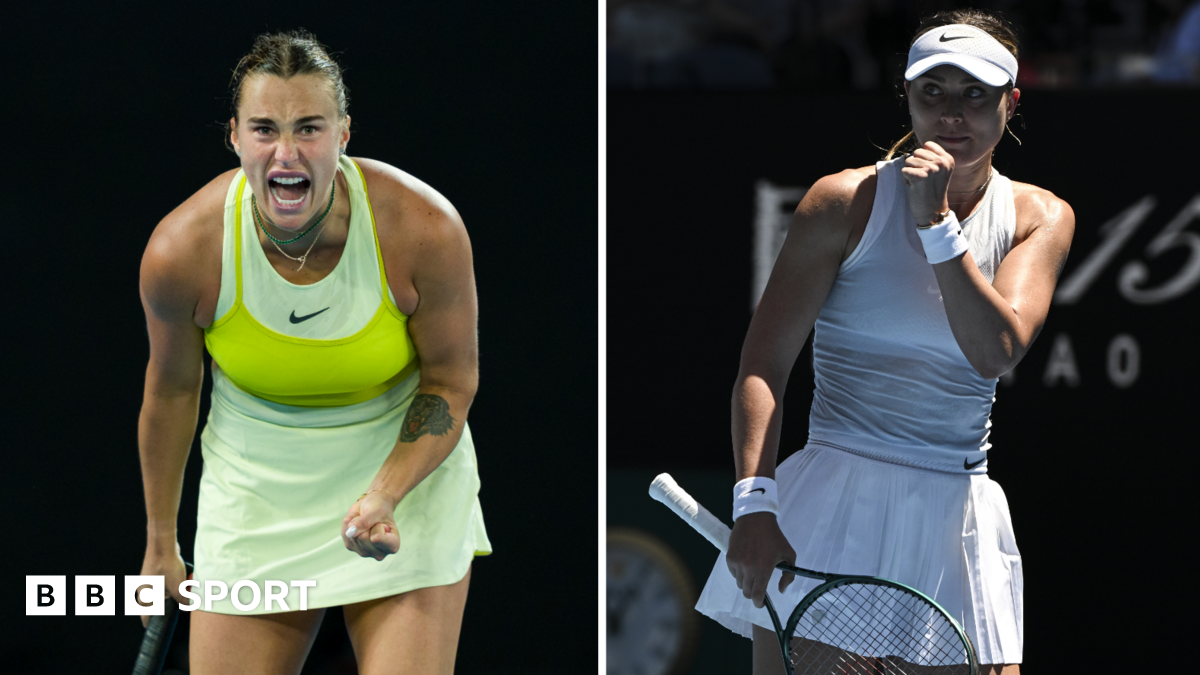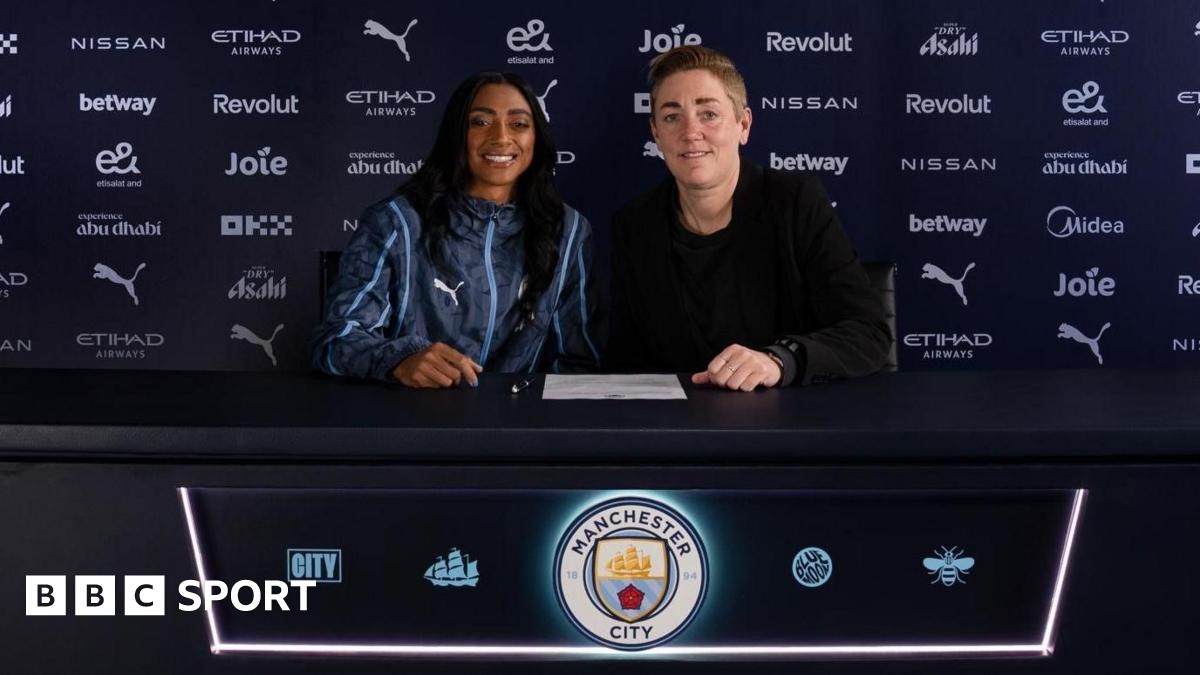ARTICLE AD BOX
 'The Roman Empire' flag was on display at Stamford Bridge on Sunday, and some fans chanted Roman Abramovich's name while some Newcastle supporters taunted their rivals with "no noise from the bankrupt boys" and "Chelsea are skint, the Mags are rich" songs
'The Roman Empire' flag was on display at Stamford Bridge on Sunday, and some fans chanted Roman Abramovich's name while some Newcastle supporters taunted their rivals with "no noise from the bankrupt boys" and "Chelsea are skint, the Mags are rich" songsThe sanctioning of Chelsea owner Roman Abramovich in the wake of Russia's invasion of Ukraine has, perhaps like never before, forced English football to confront questions over who exactly should be allowed to own its top clubs.
With the risk of letting clubs becoming embroiled in geopolitics now exposed, football authorities and the government will face questions in parliament on the issue on Tuesday.
So what should and can be done? Why has it taken until now? Is it too late? And what damage has been done?
'The sportwashing derby' and difficult days for football
These are certainly chastening days for the sport. Sunday's match between imperilled Chelsea and Saudi Arabian-bankrolled Newcastle United was dubbed in places as 'the sportswashing derby'. It was portrayed by some critics as one of the darkest episodes in the history of the Premier League.
With the Club World champions in turmoil, sponsors deserting the club, and fears of financial ruin amid a block on merchandising and ticket sales, Chelsea's fans now face opprobrium because a section of their support continue to sing the name of the man whose fortune brought them almost two decades of glory.
This singing was despite the government describing Abramovich as "a pro-Kremlin oligarch" who has had a "close relationship" with Vladimir Putin for decades, and obtained "financial benefit" and "preferential treatment" from that relationship.
One of the companies Abramovich co-owns, the government claims, may even have made steel for Russian tanks. That has been denied by the firm and Abramovich - who has always rejected suggestions of links with the Russian President.
But given the horrors Putin has unleashed on Ukraine, many are appalled that so many Chelsea fans remain loyal to the oligarch, and concerned at what that reveals about football's priorities and values.
- Q&A: What do UK government sanctions on Abramovich mean for Chelsea?
- Nick Candy wants fan on board if takeover of Premier League club successful
- Listen: The Sports Desk podcast - Life after Abramovich & what's next for Chelsea?
- Chelsea fans face up to life after Abramovich
As if the sight of a pro-Abramovich banner at Stamford Bridge was not uncomfortable enough for the game, the manager of Newcastle United then found himself (again) facing questions over Saudi Arabia's human rights record at his post-match press conference.
Eddie Howe was asked about the 81 executions the country had just carried out in a single day.
Howe insisted he would "stick to football" and many Newcastle fans seem to think such questions are unfair. Certainly it would be better if a representative of the club's majority owners PIF was available to be asked such questions. Similarly, there would have perhaps been more transparency and accountability at Chelsea if Abramovich had granted the occasional interview over the years where he could have faced questions over his motives for owning the club.
Many feel such questions to Howe are both inevitable and entirely legitimate when - despite the club's insistence of separation between the club's majority owner sovereign wealth fund PIF that controls the club and the Saudi state - PIF is chaired by the country's ruler, Crown Prince Mohammed bin Salman himself.
Or when - just as Chelsea executives have asked manager Thomas Tuchel to field questions about the sanctioning of the owner - no-one from PIF gives an interview or press conference themselves. Or when a Saudi flag was spotted among Newcastle fans at Stamford Bridge. And when Saudi Arabia is itself engaged in a war - in Yemen, in which, according to Human Rights Watch "all parties… have committed serious violations of the laws of war, many of which may amount to war crimes…"
Many Newcastle fans in turn point to the £11bn of annual trade the UK does with Saudi Arabia - including being one of the world's largest sellers of arms to the kingdom - and ask why football should be held to a higher standard.
They ask why investment into a club such as theirs should be blocked when the government is happy to do business with Saudi Arabia in other industries. Indeed, this week the Prime Minister himself is reportedly poised to visit Riyadh for talks on oil.
Chelsea fans can point to the way Russian finance was warmly welcomed into London over the last two decades, and ask why they should be singled out.
As Liverpool manager Jurgen Klopp asked last week: "Did anyone really care when Roman Abramovich came to Chelsea? Did anyone really care when Newcastle got taken over? Do supporters really care?"
Klopp did say football needs to "think more about where the money is coming from", adding: "It is pretty obvious where the money is coming from. Everyone knew it, but we accepted it. That's our fault. It is society's fault so we accepted it. Now we cannot accept it anymore and so we punish them. It is not Chelsea's fault. Not at all."
'We all have to start waking up - it is a point in our history'
Others of course insist none of this makes it right, and that football clubs - as vital cultural and community assets - should be afforded greater protection than other businesses. And also that, because of the global profile and prestige they offer owners, there now needs to be much greater recognition of the risk that they are exploited for 'sportswashing' purposes.
"We've got to think now about how we protect our assets," says Simon Chadwick, professor of sport business strategy and marketing at Coventry University.
"As a country we need to engage in a much more informed debate about what we want from football, to set aside personal interests and rivalries and decide as a community what we like."
Chadwick accepts football club ownership simply reflects the country's willingness over decades to open itself up to investors from across the world as a means of maintaining status, wealth and power.
But he also believes English football has been slow to address unstoppable forces connected to globalisation, digitalisation and the environment, with countries in the East trying to use energy revenues as the basis for diversifying their economies and extending their political influence across the world.
"This is a point in our history," he warns. "We all have to start waking up because what we all realise is that football has become deeply embedded within a geopolitical network that is very hard to extricate oneself from.
"What it's done is to raise awareness that we're exposed and vulnerable to the advances of other countries."
It is not just Chelsea, of course, who have been exposed by Russia's invasion.
Manchester United have had to drop their sponsorship deal with airline Aeroflot. Uefa has had to do the same with state-controlled energy giant Gazprom.
Fifa meanwhile faces renewed accusations it may have helped embolden Putin when, despite the annexation of Crimea in 2014, the Russian president was able to use the 2018 World Cup to project a positive image of his country to the world.
The sense of overdue reckoning that English football is now experiencing will intensify this week when senior executives from both the FA and Premier League - along with the Sports Minister - are questioned by MPs on the Digital, Culture, Media and Sport committee about the role of Russian money in both the ownership and sponsorship of clubs.
But as Newcastle United have discovered, the conflict in Ukraine will force questions about the motivation of investors from other countries too, as well as a focus on the source of funds.
Since the UAE joined China and India by refusing to back a US resolution at the UN Security Council condemning Russia's invasion, there has been renewed scrutiny on Manchester City's Abu Dhabi owners.
City are of course majority owned by the investment group of Sheikh Mansour, a member of the Abu Dhabi ruling family and deputy prime minister of the UAE.
Will Pep Guardiola - like Howe - now be asked to comment on the UAE's role in the Saudi-led military operation in Yemen? Or the country's human rights record?
Asked last week for his thoughts on Chelsea, Guardiola said he would wait to be more informed before giving his opinion: "We are the face of the club, we are here every few days. You have to understand there are subjects we don't know and don't have an hour lesson to speak and talk about.
"It looks like we have to know absolutely everything. We are human beings - I don't know."
City, like Newcastle and Chelsea, reject any suggestion of 'sportswashing' of course.
City, for instance, can point to the profit they made in their most recent accounts, and insist they are now a sustainable organisation, with Abu Dhabi's investment helping to regenerate the east of Manchester. They point out that the club has Chinese and American investors as well as the controlling stake from the UAE.
Similarly, Newcastle United have vowed to invest in the wider north-east of England region.
But it feels significant that the DCMS committee has warned on Tuesday it will also ask "if the government is concerned about investments in UK sport from other nations with poor human rights records such as China and Saudi Arabia".
What could happen next?
The Sports Minister Nigel Huddlestone is bound to be asked where the government is up to with its response to the fan-led review his predecessor Tracey Crouch published last year in the wake of the proposed Super League and a series of clubs falling into financial difficulties.
He is also likely to be asked whether the events of recent weeks have made it more likely the government will accept in full Crouch's recommendation for an independent football regulator with the power to rule on a beefed-up Owners and Directors Test - which the former minister believes would have "stress-tested" the Saudi takeover more than at present.
Huddlestone could also be asked how the government feels about football being used to improve a country's image and if it is prepared to consider making a special case of clubs, barring potential owners with direct links to states, governments and rulers, and risk sacrificing the investment and jobs that have accompanied such acquisitions?
And indeed whether the model that will now be applied to Chelsea - with the government effectively needing to approve any new owner - should now be used for all future takeovers? The benefit of greater fan ownership could also be discussed.
Premier League policy chief Helen MacNamara, who is also appearing in front of MPs, will no doubt be asked if the clubs who so fiercely opposed Crouch's idea of an independent regulator have now grudgingly accepted something needs to change.
That could include a human rights component being incorporated into its owners and directors test, as demanded by Amnesty, as the league conducts its own review of its regulations - and whether owners should be mandated to engage with the media and fans in the interests of accountability and transparency.
Football - when challenged over its sustainability and governance - has proved resistant to change and outside interference. Even after the Super League controversy, the FA pushed back against an independent regulator, its chair Debbie Hewitt insisting it could be trusted to take on the role.
But there now seems to be renewed momentum behind those who believe Chelsea's predicament - and the unedifying mood surrounding Sunday's match, set against the appalling suffering in Ukraine - is a warning that must be heeded by the game, and that this time, something has to change.

- Six films that got their facts wrong: From the Jamaican bobsleigh team to Sylvester Stallone's goalkeeping heroics
- 'King of Spin': A look back to when Michael Vaughan sat down with cricket legend Shane Warne


 2 years ago
24
2 years ago
24








 English (US) ·
English (US) ·